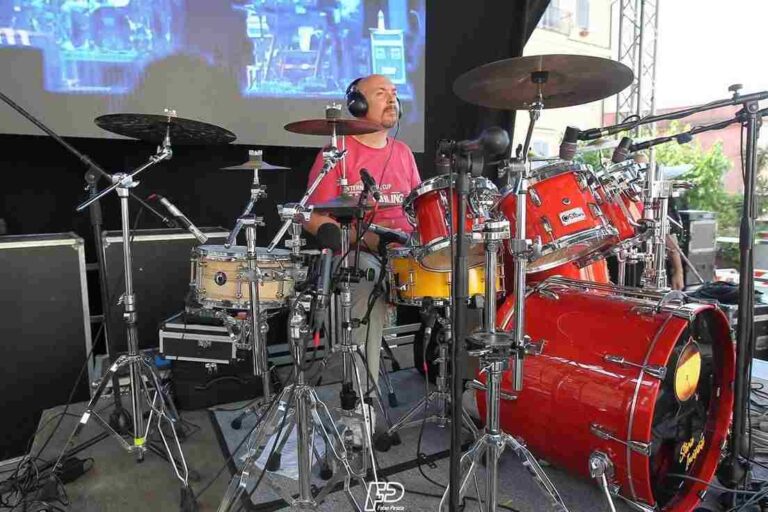The Gig Triangle: “tutti vogliono essere una rockstar!”
Il Triangolo della Gig, ovvero il metodo del Due su Tre, spiegato da Marc Turiaux batterista degli RPWL.
“Tutti vogliono diventare una rock star!”. Ricordo che questa frase mi girò per la testa per un pochino. Fu anni fa, quando la disse il mio insegnante di batteria con cui stavamo discutendo riguardo come mai ogni musicista abbia l’ambizione di salire on stage. Anche quelli che sono timidi e che passano la maggior parte del loro tempo ad esercitarsi chiusi nella loro stanza. Non è che il mio insegnante intendesse quella frase letteralmente, ovviamente. Ma ciò che voleva dire era che, secondo lui, ogni musicista desiderava essere visto, riconosciuto, apprezzato. Non potrei essere più d’accordo. Penso che ogni musicista per prima cosa si sforzi di ottenere questo. E’ il motivo per il quale prendiamo in mano uno strumento, non per la fama o i soldi.
Riuscire a mantenersi facendo il musicista

Ma quando uno desidera suonare e farlo per vivere, allora la maggior parte dei musicisti devono vedere questo lavoro con un occhio diverso, perché le bollette vanno pagate. Purtroppo la maggior parte di noi si accorge che le gig commerciali sono pagate meglio e più regolarmente di quanti non paghino i concerti dove esegui la tua musica. Ovviamente esiste sempre il fenomeno di chi riuscirà fin dall’inizio a girare il mondo esibendosi o chi farà un gran successo con la sua prima hit. Ma queste sono eccezione, non la regola. La maggior parte delle carriere dei musicisti freelance si basano sulla persistenza e il duro lavoro. Sul non abbandonare mai la speranza e l’ambizione di approdare, un giorno, in un posto dove con il tuo lavoro sarai riconosciuto ed apprezzato come artista.
Il Triangolo della Gig: come trovare un equilibrio
Ecco qualche metodo per mantenere in equilibrio le tue esigenze commerciali e quelle artistiche. Molti musicisti che conosco insegnano per lo meno uno o due giorni alla settimana. Loro non costruiscono la loro carriera sull’insegnamento. Sono musicisti che insegnano, non insegnanti che fanno anche dei concerti una volta ogni tanto. Poi c’è il campo de commerciale, delle band funzionali per il lavoro, dove sei pagato per suonare ad un evento o ad un party privato. Questi lavori ti procurano paghe decenti, ma ovviamente la musica che non è sempre quella che sognavi di poter suonare. E nessuno vuole rimanere incastrato in gig commerciali per tutto il tempo fino a dimenticare le proprie ambizioni artistiche.
Tra queste alternative spesso è difficile decidere quale corso seguire e quali gig suonare. Non vuoi finire a suonare musica che non ti piace soltanto per i soldi e alla fine perdere la passione per sul tuo lavoro. Ma non puoi neppure suonare sempre e soltanto la tua musica preferita senza riuscire e mantenerti.
Il metodo del “Due su Tre”

In queste situazioni il “Due su tre” si è dimostrato un buon modo per decidere quale gig accettare e quale lasciar andare. L’idea è che dovresti suonare una gig soltanto se riesci a guadagnati almeno due di tre possibili benefici.
In un modn perfetto, una gig dovrebbe essere ben pagata. Dovresti eseguire buona musica che ti stimola e dividere il palcoscenico con persone simpatiche. Avere tutti e tre questi benefici in un solo show è abbastanza raro, ma se ne hai almeno due, allora va tutto bene. Se pagano bene e puoi suonare con degli amici. E’ okay anche se il mio cuore non appartiene al 100 percento a quella musica. Oppure la musica è grandiosa e gli altri che suonano sono simpatici. Posso comunque accettare anche se la serata non viene pagata poi così bene.
Il “Due su Tre” per gestire meglio la carriera di musicista freelance

Ho scoperto che questo mi aiuta (e aiuta molti altri) ad avere un’immagine chiara di come amministrare il mio lavoro di musicista freelance senza perdere concentrazione sui miei obiettivi a lungo termine. Mi da anche la libertà di potermi rilassare se sono in mezzo ad un progetto che non viene pagato benissimo ma che mi stimola e mi aiuta a mantenermi motivato ed appassionato nei riguardi del mio lavoro. Molto spesso noi ci teniamo lontani da questi progetti perché tutti sentiamo il peso dei problemi finanziari. Ed è vero.
Essere un musicista professionista significa che sarai pagato per il tuo tempo e per il tuo lavoro. Ancora, parlando dal mio punto di vista personale, penso sia spesso utile investire un po’ di tempo in un progetto senza guardarne il lato commerciale fin dall’inizio. Potrebbe anche aiutarti a crescere come musicista o , cosa anche migliore, ad evolverti e questo alla fine ti avrebbe ripagato di tutti gli sforzi.
“Everybody wants to be a rock star!” – I remember it took a moment until I got my head around that sentence. It was years ago and my drum teacher and I were discussing why every musician had the ambition to get on stage. Even those that are shy and who spent most of their time in the practice room. He didn’t mean that literally, of course. What he wanted to say was that in his opinion every musician wants to be seen, recognized and appreciated. I couldn’t agree more, I think that is what every artist is striving for in the first place. That’s why we pick up an instrument, it’s not fame and money.
To make a living out of playing music
But as soon as they want to make a living out of playing music, most musicians have to take a new look at the job, because the bills have to be paid. Unfortunately most of us will find out that commercial gigs pay better and more regularly than playing concerts with our own original music. Of course there is always the one prodigy that will play concerts all over the world right from the start, or the new band that hits success with the first single. But these are exceptions, not the rule. Most freelancing careers in music rely on persistence and hard work. On never giving up the hope and ambition that in the end you will get to a place in the business where you will be recognized and appreciated as an artist.
The Gig Triangle: how to find a balance

There are a few ways to keep the balance between commercial and artistic needs: A lot of musicians I know teach at least one or two days a week. Yet they do not build their careers on teaching; they are musicians who teach – not teachers who still play gigs now and then. And then there is the field of commercial or functional bands and jobs, where you are hired to play at an event or a private party. These jobs might pay decent money, but of course the music will not always be what you dreamed of playing. And nobody wants to get caught up in doing commercial gigs all the time and forget about artistic ambitions.
Between these alternatives it’s often difficult to decide which course to follow and which gigs to play. You don’t want to end up just playing music you don’t like only for the money’s sake and in the end lose the passion for your job – but you can’t only play your favourite music and not be able to support yourself.
Two out of Three
In these situations the “Two out of Three” has proven to be a good way to decide which gigs to play and which to let go. The idea is that you should play a gig only if you take away at least two out of three possible benefits.
In a perfect world, a gig should be well paid, it should call for good and challenging music and you share the stage with nice people. All three benefits in one show are rare, but if two are provided, everything is fine: if the money is good and I play with friends, it’s ok if my heart is not 100% in the music. Or if the music is great and the people are nice, I can accept that the evening doesn’t pay that well.
Two out of Three to help your freelance musician career

I found out that this helps me (and many others) to get a clear picture of how to handle my job as a freelance musician without losing focus of my long term goals. It also gives me the freedom to relax if I do a project that might not be paying so well, but that is challenging and helps me stay motivated and passionate about my job. Very often we shy away from these projects because we all feel the financial pressure. And it’s true.
Being a professional musician means we should get paid for our work and our time. Yet, speaking for myself only, I think it’s often useful to invest some time into a project without looking at the financial side of it right from the beginning. It might either help me to develop as a musician or – even better – it might evolve and literally pay off in the end.
LEGGI ANCHE:
- Marc Turiaux: come affrontare e vincere lo “stage fright”
- RPWL: Intervista a Marc Turiaux, il batterista della rock band tedesca
- Cosa occorre per diventare un musicista? Risponde Marc Turiaux degli RPWL
- In tour con Marc Turiaux: RPWL on stage in giro per il mondo
- Marc Turiaux degli RPWL: i miei eroi alla batteria e le mie influenze musicali
- Il costante apprendista: quando l’esercizio diventa un lifestyle. Ce lo spiega Marc Turiaux degli RPWL
- Come diventare un batterista di talento. Marc Turiaux degli RPWL consiglia: scopri i tuoi punti di forza
- Yogi Lang: intervista al cantante degli RPWL
- Esce The Hunting Party, il nuovo cd dei Blind Ego. Intervista al chitarrista e mastermind Kalle Wallner
- “RAUHBEIN: Esplode ‘Adrenalin’, il Terzo Album da Record della Band Tedesca”
- Il ritorno dei Bonfire con il cd Higher Ground








